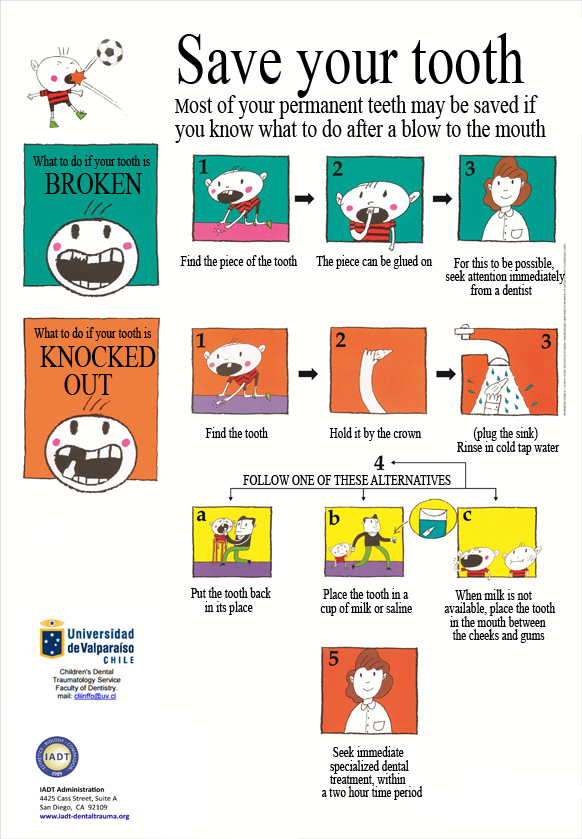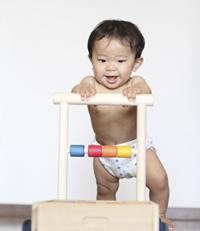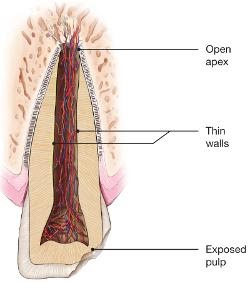- care@skerriesdental.com
- 0180 29011
Dental Trauma Information
What you should know about injuries of primary teeth from IADT
When the child first starts exploring the world by themselves, with the help of their first baby walker, they are exposed to falls that can affect their face and teeth. During the first years of life, the primary teeth are very closely related to the permanent teeth, which are forming inside the bone.When injury occurs to the primary teeth in this period, it can affect the aesthetics of the permanent teeth, which will present at approximately eight years of age with whitish marks or a deformation in the crown depending on the extent of the injury. The most serious lesions on the primary teeth can cause complications to the permanent successors; ie. intrusion (when the tooth is buried in the gum) and avulsion (when the tooth is knocked out). Both situations are more serious the younger the child is. The primary tooth should not be replaced once it has been knocked out.
What you should know about dental injuries of primary teeth?
When the child first starts exploring the world by themselves, with the help of their first baby walker, they are exposed to falls that can affect their face and teeth. During the first years of life, the primary teeth are very closely related to the permanent teeth, which are forming inside the bone.When injury occurs to the primary teeth in this period, it can affect the aesthetics of the permanent teeth, which will present at approximately eight years of age with whitish marks or a deformation in the crown depending on the extent of the injury. The most serious lesions on the primary teeth can cause complications to the permanent successors; ie. intrusion (when the tooth is buried in the gum) and avulsion (when the tooth is knocked out). Both situations are more serious the younger the child is. The primary tooth should not be replaced once it has been knocked out.
How to prevent dental trauma in primary teeth?
- Do not use baby walkers.
- Do not let children use roller skates without protection.
Teach your children to:
- Look after their teeth as well as that of their friends’ teeth when playing by not knocking their teeth with heavy objects.
- Watch out for possible obstructions that they can trip themselves up on.
- Do not push when playing.
- Stay seated on the swing and do not jump off when the swing is in motion.
- Use the stairs when getting out of the swimming pool.
- If the child participates in sports such as rugby, hockey, karate, riding on a bike, wintersports (i.e. skiing) a skate board or any activity that involves potential trauma to the facial area, make sure that the child uses a helmet or mouth protector
What to do in case of a fall that affects a permanent teeth?
First, you must consult a dentist immediately after the accident has occurred. This measure has many advantages:
- There is more possibility of conserving the tooth’s vitality.
- A conservation treatment will be applied.
- There is a better prognosis.
- Future complications and high cost treatments are prevented.
- It is of vital importance that all traumatic injuries are diagnosed, treated, and controlled in time (at least within five years).
What to do if a permanent tooth is broken or knocked out?
- Find the tooth. Hold the tooth by the crown (the white part), not by the root (the yellow part).
- Replant immediately, if possible.
- If contaminated, rinse shortly with cold tap water and put the tooth back in its place. This can be done by the child or an adult.
- Hold the tooth in place. Bite on a handkerchief to hold it in position and go to the dentist immediately.
- If you can not put the tooth back in, place it in a cup of milk or saline. When milk or saline are not available, place the tooth in the child’s mouth (between the cheeks and gums)
- Seek immediately specialized dental treatment
- Children between 7 and 10 years of age are more exposed to suffer avulsion due to the elasticity of the bone at this age.
- Good oral hygiene is absolutely necessary in the healing period

Tooth SOS App
on Apple Store

Tooth SOS App
on Google Play Store







